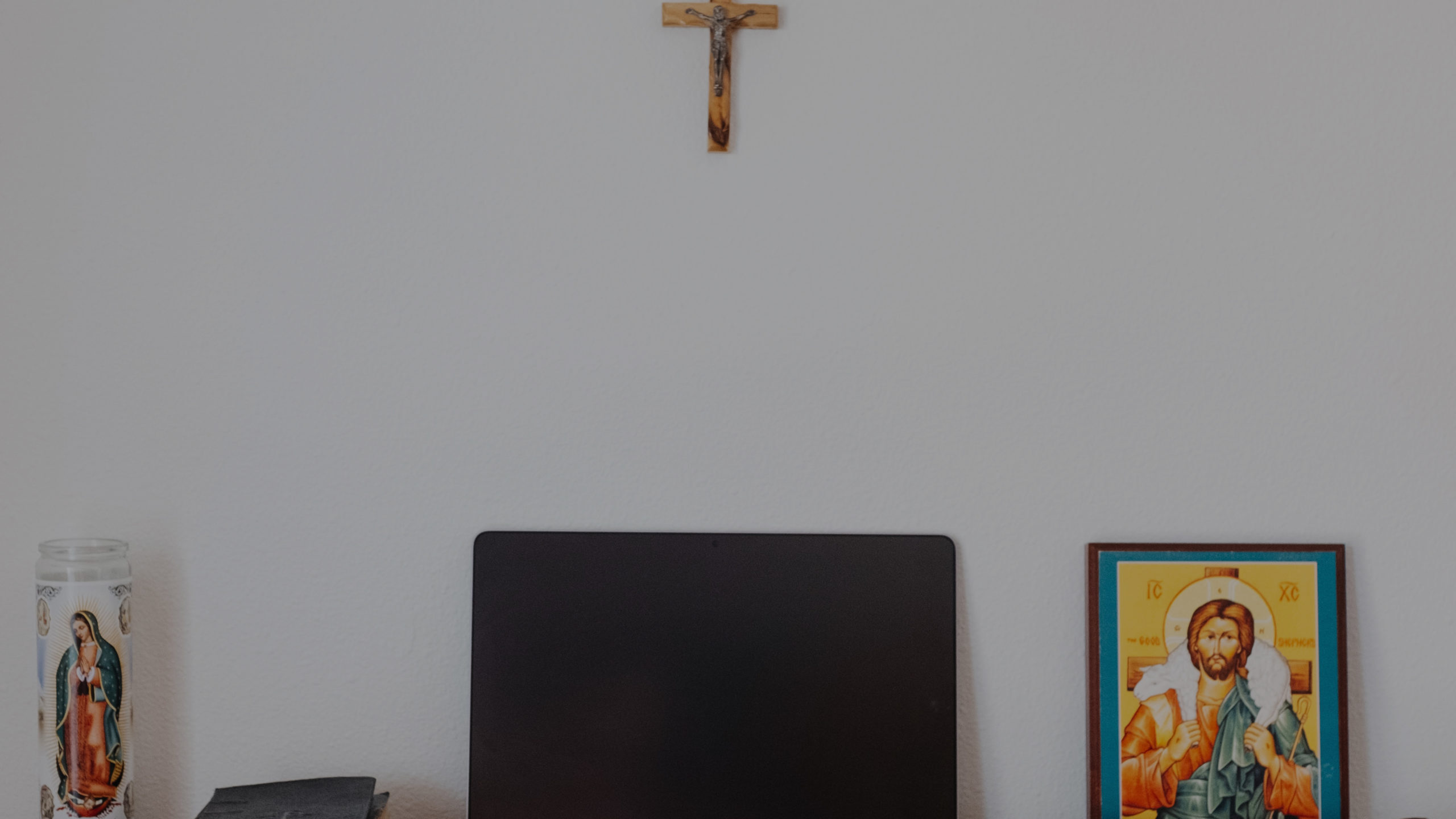These are the things I’m missing and I bet you are, too: the Eucharist; Adoration; going to confession. As priests utilize digital media to bring us before the Eucharist and find creative ways to provide absolution while observing social distancing, the faithful are still left longing for the proximity of Mass in person, Holy Hours in small chapels, and confession in enclosed spaces.
There are moments when I find myself running about the streets of my heart, reciting the Song of Songs: “On my bed at night I sought him whom my soul loves—I sought him but I did not find him. Let me rise then and go about the city, through the streets and squares; Let me seek him whom my soul loves. I sought him but I did not find him” (Song of Songs 3:1-2).
On the first Friday night of our self-quarantine, my husband and I asked Fr. Stephen Gadberry, one of the Word on Fire Institute Fellows, to help us with an Instagram “Live Holy Hour” with music. It was incredible. At any given point, there were about sixty people simultaneously adoring from all over the US, Africa, Australia, Croatia, and Italy, to name a few. The moment that Fr. Stephen exposed the Eucharist within the monstrance, I peered through my tiny phone screen and the only words I could muster were, “I had no idea that I missed you this much.”
Isn’t that the positive notion of absence from the one we love? We grow in fervor to be with him again.
In eleven years of marriage, my husband and I haven’t spent much time apart—a night or two here and there—but a few years ago I attended a weeklong seminar at Franciscan University, leaving him and the kids behind. One night, I Facetimed him and he put our fourteen-month-old daughter on the phone. Having never been separated before, she was so excited to see me. But that quickly turned into agony when she realized that she couldn’t touch me. After a few howling attempts to hug me, my husband quickly ended the call, and promptly texted me, “No more Facetiming.”
Right now, I feel—perhaps we all feel—a bit of what my daughter felt then. Technology has been a gift during this time, allowing us to see the One whom our hearts love, but it has also been a reminder that we cannot be with him physically. My daughter’s howls at her failed hugs come to mind.
What can the faithful do in this time of distance from the sacraments, from our parish, from our priests?
For one thing, this is a perfect time to practice the Liturgy of the Hours, to pray the rosary, to read spiritual and intellectual works—all in an effort to grow in relationship with Jesus. I miss the Mass, but I have also learned that my habitual obligation often displaced my desire to grow in relationship, my desire to encounter Jesus and allow him to encounter me.
This point deserves further explanation. If my husband entered our home after work, ate dinner with us, assisted with the bedtime rituals for the family, helped to clean up the house, and repeated this same cycle every day without taking the time to embrace me, without having deep conversations with me—without sharing his heart with me—what would it make of our covenant? Relationship requires an ever-increasing desire to know the other and be known in return. When intentional encounter is replaced by rubrics and obligation, the fire will lose its flame. Attending to duty alone is not enough.
The time that I spent away from my family wasn’t for naught. The seminar was geared toward the philosophy of Dietrich von Hildebrand, St. John Paul II, and Edith Stein. On the last night, I was asked to give a toast at the closing banquet. I remember saying, “Diving into philosophy has made me a better wife, a better mother, and a better Christian.”
My absence from my family allowed me to not only grow in my understanding of myself but also how my “self” relates to being with them. In the same way, our absence from the physical Body of Christ makes way for us to grow in understanding of who we, each of us, are—the better to understand how we, you and me, relate to and within the entire Body of Christ.
There is something that you have been putting off for quite some time. Maybe it’s a book, a devotion in prayer, a novena, an intellectual work. It has been pushed aside because “space” wasn’t available to make room for it. Now, we have more space than some of us really wanted or ever asked for. Your schedule has slowed down. All the distractions are far more distant. All there is left to do is “be.”
This is the time to grow in fervor for our beloved, to speak heart-to-heart with Christ in ways that perhaps we do not when the sacraments are available to us, and “duty” is seen to; to enrich all of the doing with an opportunity to simply “be” with Christ—to find his peace in the middle of seeming chaos—and then bring all we have learned within that “being” back to the parish, for the sake of the whole community. When we return to our communal worship, let us do so with greater love, with a greater appreciation: for the opportunities to pray the Mass together, for Adoration, for the priesthood, and for the haven that we find within the walls of our parish home.
“Deep waters cannot quench love, nor rivers sweep it away” (Song of Songs 8:7).

